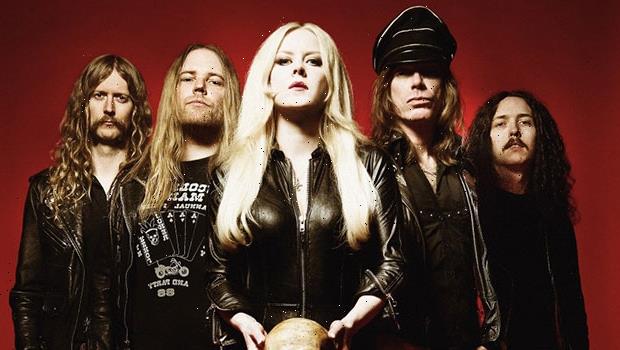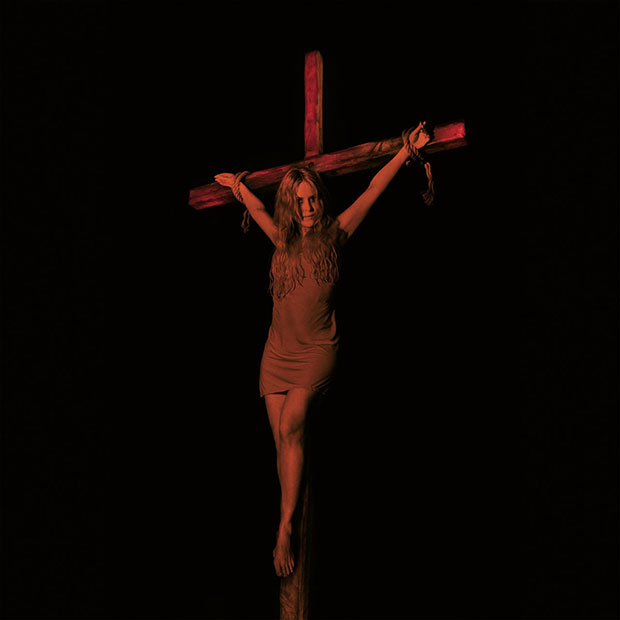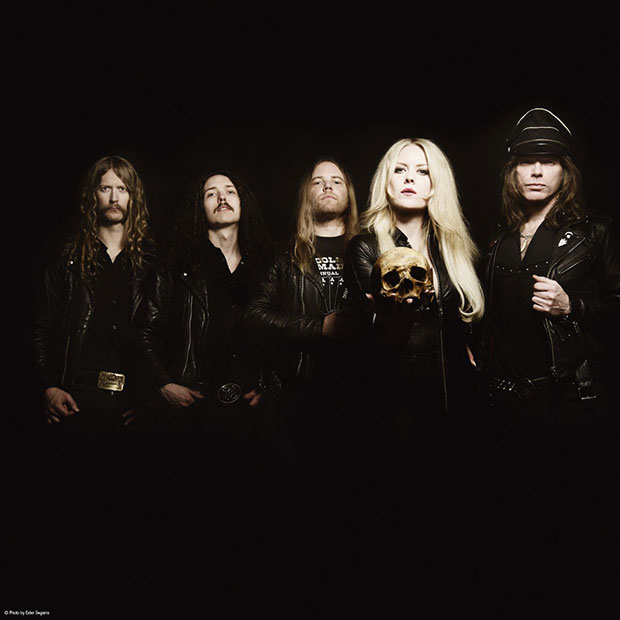Just in time for Halloween, Lucifer are back with a phenomenal new album, one with artwork that transforms ‘an image of being a victim’ into one of defiant power.
Lucifer IV is one of those rare times that you can judge a book by its cover. In this case, the cover belongs to Lucifer‘s latest full-length, arriving two days before Halloween. With singer Johanna Sadonis illuminated in red while bound to a wooden cross against a black, featureless background, the album’s artwork is stunning, almost chilling at first glance. “Well, I had the idea,” Johanna says to HollywoodLife, as she and Nicke Anderson spoke about the new release. “I’ve seen other women on crosses, and I always found that very striking. There’s a famous picture of Diamanda Galás shot by Annie Leibovitz. And there is Madonna famously on the cross on a tour, you know, where they lift her, and she sings, ‘Live To Tell.’ I think it’s so striking because people are so used to Jesus on the cross. And women used to be put on crosses as witches. To turn this into a powerful image, instead of an image of being a victim, I thought, is a great idea for an album cover.”
“And maybe also, a little bit daring, you know, and I think you need that in rock,” she says. “You need a good album cover to stick out of the record shelf. I also thought, besides it being a striking image, it’s personally–it’s a little bit my ‘f-ck you’ to the patriarchy. Because, as you can probably imagine, as a woman, sometimes it’s not so easy in music — in the world in general, but especially in music.”
It’s a brilliant piece of art, its magnificence is only amplified by the equally-incredible music within. Lucifer IV sees the band – Johanna, Nicke, Martin Nordin, Linus Björklund, and Harald Göthblad – unleash another installment of their 70’s-inspired, modern metal sound. It’s a phenomenal record, one where Lucifer accentuates what makes them special in the world of rock today. The drums hit harder, the guitars soar higher, the vocals electrify, and the songs are classics in the making. Lucifer rocks on Lucifer IV while touching on themes about morbid covenants (“Wild Hearses”), witchcraft (“Crucifix (I Burn For You”), pagan gods (“Nightmare,” “Phobos”), and death (“Mausoleum”) and betrayal (“Cold As A Tombstone.”)
Related Gallery
Stars Celebrating Halloween 2021: Billie Eilish, Kyle Richards & More
These are not unfamiliar subjects for Lucifer. “I think for us it’s hard to step outside of our own box,” says Johanna, “because I think these themes have always been subjects to Lucifer’s lyrics. Maybe they’re more prominent on the recent album, maybe the recent two albums? But I guess the devil is just more fun because the devil stands for all the fun things in life or the things you’re not supposed to do.”
“Lucifer’s not really a concept band,” she adds. “Everything is going a little bit by gut feeling, so things magically fall into place, like puzzle pieces. Sometimes I don’t even know where they’re coming from.” Much like all good art, Lucifer IV treads that razor-thin line between personal and universal. It’s easy to listen to the album and interpret it any given way. When Johanna sings about “one to set me on the cross,” is it the same one from the preceding song? Is there a running thread of souls who’ve “taken the vow” for immortality, only to find fire and pain? That is for the listener to decide.
https://youtube.com/watch?v=-ZRyuciuKtE%3Fversion%3D3%26%23038%3Benablejsapi%3D1%26%23038%3Borigin%3Dhttps%3A
“It wasn’t like we sat down and said, ‘okay, let’s make a really dark album revolving around witchcraft,’” says Johanna. “It just kind of happens so to be. All the lyrics are very personal, but I like to wrap them up into these metaphors that fit within the Lucifer frame because it’s just more fun. I think if I would dish out my personal stories as blunt as they were in real life, it would probably be cheesy, boring, or whatever. But if you can spice it up with metaphors or symbols that stand for certain figures in life. I think that’s way more interesting because it gives listeners a sort of canvas where they can project their own feelings or associations onto it.”
“As a music fan,” she says, “when I listen to an album or a song, I want to find something where I can get my hooks in and where I can relate to it. It empowers me, or it comforts me, or whatever you are looking for in a song. I hope I can do that to people. For me, it’s a great way to work through stuff. It’s kind of like my personal diary. It’s like therapy, writing stuff, you get it out there, and then you work through it, and you can move on.”
One could say that Lucifer IV is a triumph that arose out of tragedy. The band released Lucifer III in March 2020, right as the COVID-19 pandemic shut the world down. Impossible to tour their new record, Lucifer went back into the studio and began working on another album, one that would be divorced from the hellscape that was 2020. “I don’t think we thought about the pandemic when we wrote the album,” says Nicke. “I don’t write any lyrics for Lucifer, but when I play music… That’s in my bubble, even though it relates to the rest of anything that touches me or inspires me. It seems like if we would’ve started thinking and singing about the pandemic, then the album would be –”
“–an album about the plague,” says Johanna.
“Yeah, but also not as timeless as we want it to be,” added Nicke. “I think with Johanna’s lyrics, they’re lyrics I like to read and listen to because they’re not super obvious into a very specific subject. You can relate to it. I mean, I can relate to it, and I’m not a woman, and that shouldn’t be the thing here. I think that’s why, when lyrics, in general, become too specific, then it’s not up for interpretation. I prefer an elusive frame for people to hear their own interpretations.”
The two also noted that when it comes to creating their art, they avoid focusing on the day-to-day tragedies, especially the constant crises that accompanied the COVID-19 pandemic. “When you write, you want to escape, and it’s a great tool to take your mind off things. That’s probably also why it was a relief to think of something different than the pandemic,” added Johanna.
https://youtube.com/watch?v=OYWccXH0csM%3Fversion%3D3%26%23038%3Benablejsapi%3D1%26%23038%3Borigin%3Dhttps%3A
Perhaps that’s one of the undeniable themes of Lucifer IV: Fun. Lucifer channels the sound that birth heavy metal, the primordial spirits of that mystical era, while infusing it with a fresh perspective and killer hooks. “Mausoleum” was made for headbanging (“I’m actually very proud of Mausoleum because it’s my first song that I wrote alone,” shares Johanna.) “Wild Hearses” is a must-have for any road trip playlist. “Bring Me His Head” could be played in any nightclub, and someone would start dancing.
Lucifer may take their music seriously, but they also make sure not to take themselves too seriously. “The whole thing with Satan, it’s supposed to be fun,” says Nicke. “That’s the way I saw it. I never got those bands who are pretentiously serious about Satan. Come on.”
“It just becomes silly and ridiculous,” adds Johanna. “You know, if you can’t incorporate humor into it a little bit… I mean, you don’t want to be a joke band, but at heart, we are rock and rollers. That’s just how it is, and there has to be humor in it. It’s enough Spinal Tap as it is.”
Lucifer IV may have humor, but it has some chops. One could say the album is the band at its finest. The group knows itself and fully embraced its sound on this record. “This is the first album where we actually — maybe it’s because of the pandemic,” says Nicke, “when we’ve done the demos, we went through the songs together as a band in the rehearsal place. Whereas, on the other albums, as soon as we had a demo ready, I just went in and recorded the drums myself because we wanted to get it done.”
This time around, Lucifer gave the demos a chance to breathe. “By having the band coming together and playing those songs and rehearsing them before going into the studio and recording them,” says Johanna, “they might gel differently because then you have time to reassess, for example, if the tempo is right or to find the right groove for a song, which you don’t really do when you record it straight away. Now, because of the pandemic, we had that time to do that.”
They also experimented a bit. “Maybe it feels like the lighter parts are lighter, for example, because we did incorporate some parts in major,” she says. “On two songs,” adds Nicke. “We have never done before.”
With the record done, all that’s left to do is get back on the road. The band has announced a European tour in November, with a second leg in February. “In November, it will have been almost two years,” says Johanna. “We are trying to shake off the life rustiness. I mean, we are rehearsing here and there, but you can’t rehearse playing a show. I can’t wait to get back to it because the last tour, which was a U.S. Tour in the southern U.S. states — was in January 2020. By that time, it felt like we were really on a roll because we’ve been touring a lot, and everything gelled. You lose that when you don’t play live for such a long time.”
“It’s a little scary, but I’m also very excited to get back out because it is different when you get some sort of chemistry from an actual audience,” she adds. “Right now, we are isolated from that still. Social media is one thing, but to see people actually react to your music? That’s special.”
Lucifer IV arrives on Oct. 29.
Source: Read Full Article










